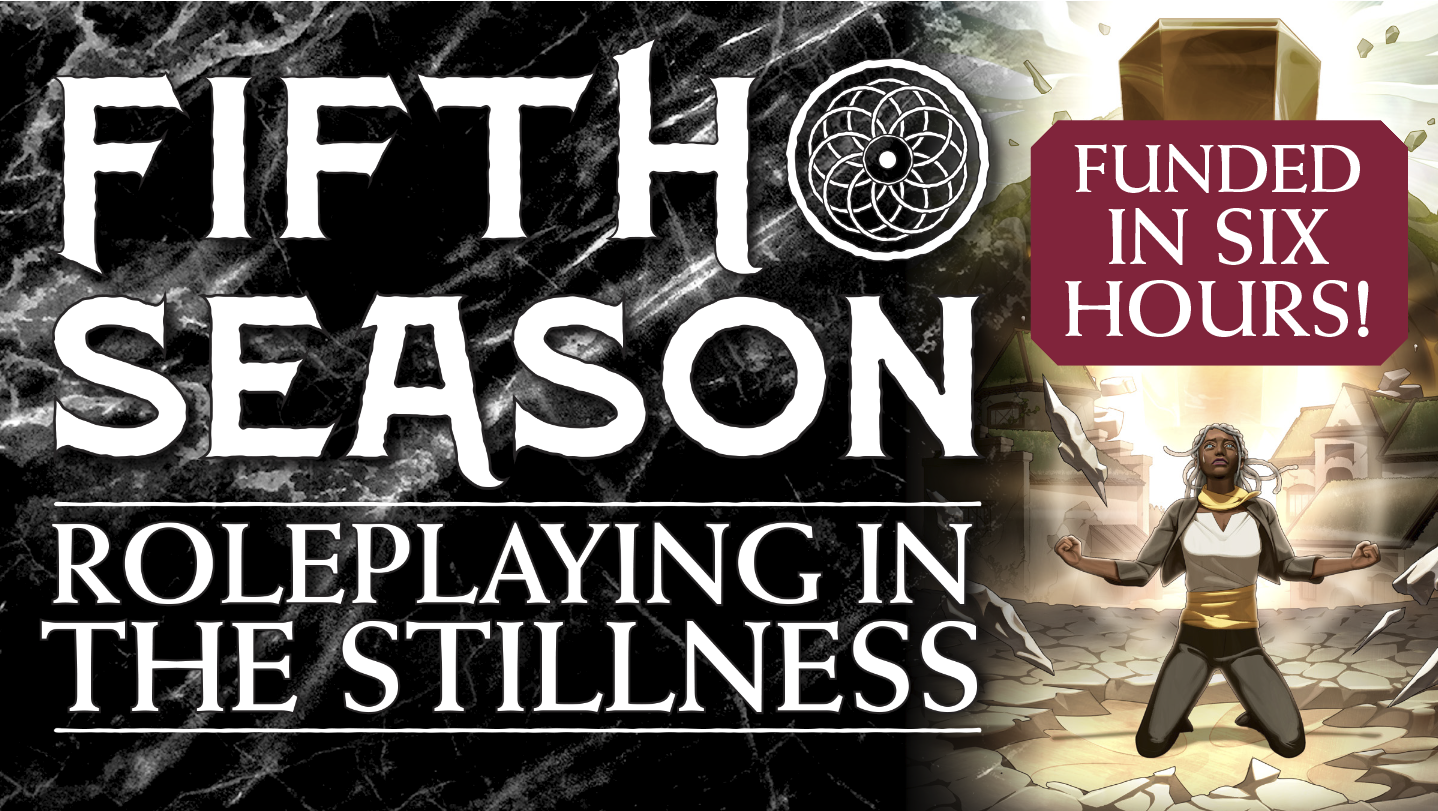We are just a stone's throw from our stretch goal for the Digital Map Pack, and should be unlocking it very shortly! Can we make it to the Encounters PDF?
This morning we have another creator interview as well!

Getting to Know: LaShawn M. Wanak (she/her)
Can you tell folks a little about yourself?
I am a speculative writer in works of fantasy and science fiction. I am also the editor of GigaNotoSaurus, an online speculative magazine that publishes one story per month between 5000 and 25,000 words.
What did you do for the Fifth Season Roleplaying Game?
I wrote the content for Use-castes in Chapter 2 and the general information about Seasons in Chapter 3.
Approach to Writing
What got you started writing?
I've always enjoyed reading since from a very young age, and I loved making up my own stories. When I was 12, I received a typewriter for Christmas and started writing stories (mostly about British women standing on moors; never finished them).
What kinds of things do you like writing? (In general, not necessarily games)
I love writing about interesting characters. Throw two people with competing ideologies into a room and you got a story. I love figuring out their relationship and seeing what it would take for them to become amazing forces of nature...or destruction... But I also love unique and weird situations and how normal people react to them. And sometimes, I just like to write about something in detail, sort of like a meditation on who a person is, or a thing, what makes it tick. Exploration, be it geographic or relational.
What do you think are some of the signature elements in your writing? What makes a LaShawn M. Wanak piece?
Most of my stories tend to be thoughtful and/or bittersweet. I like to think of some as uplifting and fun, though there was a period where I wrote a lot of stories about grief, mirroring my circumstances at the time I wrote them. Nowadays, I'm aiming for a bit more humor. Also, my writing loves to play with craft styles (parentheses and italics *galore*)
Is there anything about you/your background/your skills that you think shapes the way you approach writing?
I tend to be an observer, so I like soak in as much detail as I can, whether it is meeting new people or out on a drive or even if it's something mundane like making tea. All that observation comes out in my writing whether it's intentional or not.
Games Industry
What kinds of things do you do within the games industry?
Most of my past work has been writing supplemental fiction for games, usually short stories.
How did you get started in the games industry?
I was asked to write a short story for the Monarchies of Mau RPG game anthology.
What other games have you worked on?
I've also written for the Apex: World of Dinosaurs Anthology that accompanies the card game from Outland Entertainment.
Working on 5SRP
What drew you to work on the Fifth Season Roleplaying Game?
I absolutely loooooved the Fifth Season trilogy, so when the opportunity came to work on the core book I was absolutely thrilled.
Did you write any details you’re especially proud of?
I had so much fun writing the little fictional snippets at the beginning of each use-caste's section. I'm also particularly proud of the section on the Breeder use-caste, focusing on their importance and care. I also had fun coming up with examples on how Seasons affected the environment. I'll go into more detail about that in the next question.
How did it feel building atop N.K. Jemisin’s lore?
At first, a little intimidating, but as I started to brainstorm possibilities on how players could use the lore to build their own stories, I started having fun with it. This was especially true in the Seasons section as I wondered how would the Seasons affect people and the environment.
My favorite example is the sunflowers developing a toxic ring during a season to ward off predators. Sunflowers aren't mentioned in the books, but I do know sunflowers can be raised as a crop, and since the lore mentions plants turning toxic during a Season, I can see sunflowers developing a way to protect their seeds. Sort of a hybrid sunflower / sundew plant. A very nice and creepy detail that I hope will enhance gameplay.
Is there any sort of message or feeling you hope people take away from your writing?
Obviously, I hope people have fun playing this game. I also want the gamers to come away with a sense of community. With all its messiness and flaws, it helps to have someone to rely on for survival.
Closing Details
Is there anything else you'd like people to know?
I'm not a huge TTRPG player, but this is one of the few games I would actually love to try out. I'd definitely play as a Lorist...although with all the work I put into the Breeder caste, I might consider that as well. :-D
Are there any causes or projects you'd like to tell people about?
The biggest project I'm working on currently isn't a game, but a project with Meow Wolf, an arts immersive collective. I wrote the story for their project opening in Grapevine, Texas this summer, so for those in the Dallas / Fort Worth area, I hope you visit it when it opens this summer!
How can people get a hold of you? (i.e. website, social media, etc.)
Facebook: lashawn.m.wanak
Twitter: @TboneJenkins



